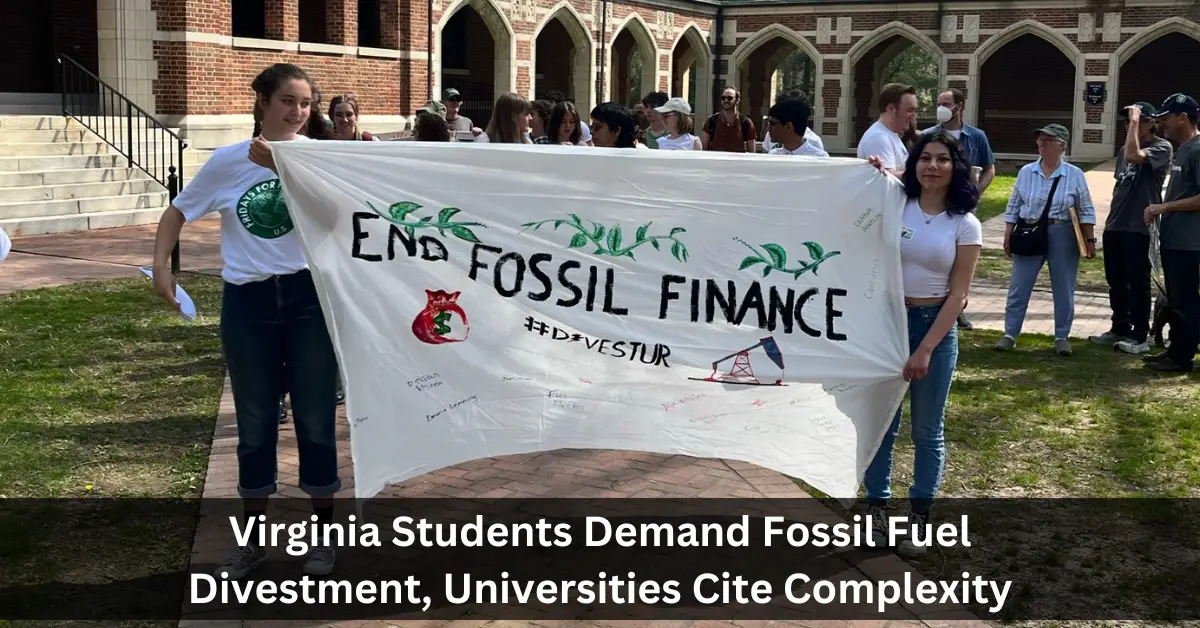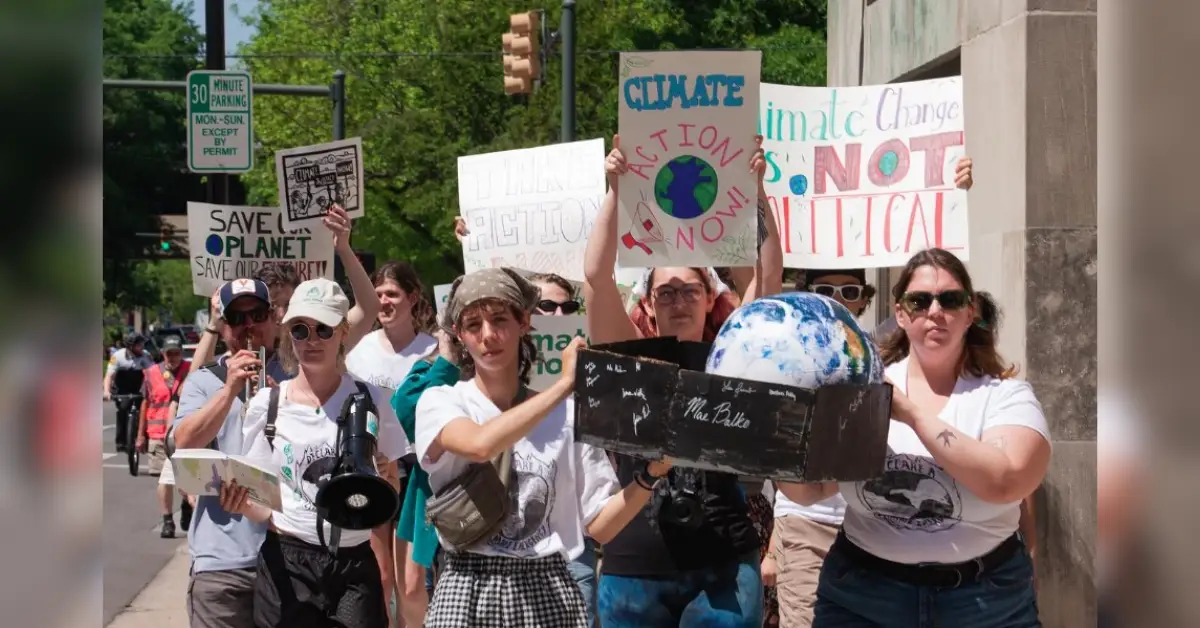Students at colleges and universities in Virginia have looked to their own campuses for action as scientists continue to provide dire warnings about the adverse effects of climate change and how fossil fuel emissions are contributing to it.
Student-run organizations have recently spearheaded initiatives at the University of Richmond, Virginia Commonwealth University, the University of Virginia, and Virginia Tech to urge the administration to divest university endowments of fossil fuel interests and instead invest in sustainable energy.
“It’s absolutely vital to the future of our planet that these massive institutions that are managing massive amounts of capital are investing in ways that are supportive of the planet rather than destructive of it,” stated Carolyn Hindle, president of Green Action!, a student organization at VCU that is advocating divestment.
However, among those institutions, only the University of Virginia has changed its investments in response to student pressure.
Some university officials contend that the student-requested modifications to investments are challenging and conflict with the necessity for the institution to guarantee the financial security of the money to maintain operations.
“You want to balance what you’re doing for students today versus what [you’re doing for] students for tomorrow,” VCU Investment Management Company’s chief investment officer, Bruce MacDonald, said.
“How can we do it so we’re not hurting people today and just favoring people tomorrow? But we also don’t want to kill everybody tomorrow.”
The Intentional Endowments Network, an organization that advocates for colleges and universities to have sustainable endowments that promote an “equitable, low carbon, and regenerative economy,” has kept track of 150 universities in the U.S. that have so far divested their endowments of investments in fossil fuels.
Unity College in Maine was the first, starting in 2012, and Harvard University was among the more recent organizations to begin phasing out investments in fossil fuels.
“I think there are a lot of approaches that can be effective,” Including divesting from fossil fuels, making net-zero pledges, or funding climate solutions, according to the network’s executive director Georges Dyer.
But divestment also conveys that the market is moving away from fossil fuel interests, according to Dyer, which helps colleges avoid the risk of their assets losing value over time.
“That, in a lot of ways, is where the impact of divestment comes from,” he stated.
Student Campaigns
University divestment initiatives launched by Virginia students have used various strategies, including campus protests, discussions with administrators, and resolutions by student governing bodies.
Students from the Green UR organization at the University of Richmond met with David Hale, the university’s chief operating officer, in February and staged a march through campus in March.
Students advised Hale that investing in fossil fuel corporations would be a riskier financial move than investing in cleaner energy sources like wind and solar, which are becoming more and more common. This might jeopardize the availability of student financial aid.
“We believe that our institution should be investing in [that] way,” stated Mason Manley, a Chesapeake Climate Action Network member and a former president of Green UR.
Power Shift Network, an organization dedicated to educating young people on how to fight for climate change mitigation measures, and Mary Finley-Brook, a professor at the University of Richmond and longtime climate campaigner, supported the students’ efforts.
In response to student pushes for divestment, UVA has set a goal of making investments net-zero by 2050. But other Virginia universities say divestment could threaten financial stability. https://t.co/QZEpA63ANi
— The Virginia Mercury (@MercuryVirginia) June 19, 2023
“When we were protesting on campus we were getting a lot of thumbs up,” Finley-Brook stated. “That was from people visiting campus as well as people on campus.”
Members of VCU’s Green Action! Submitted a divestment petition to President Michael Rao’s office in April in a similar but more theatrical manner.
The petition was put on a model planet in a casket. Additionally, the university was urged in the petition to share information on the institution’s carbon emissions and to be more transparent about where investments are going.
“They started out very timid, and then they really found their voice this spring,” stated Bill Muth, a retired professor from VCU and a member of the pro-divestment organization Third Act.
According to Ryan Wesdock, a former graduate student, Virginia Tech students adopted a more formal approach.
2019 saw the passage of a resolution by the Student Government Association urging the Board of Visitors to ask the Virginia Tech Foundation to sell “its liquid holdings in fossil fuels and fossil fuel-related industries.”
Faculty and the Graduate Student Association also approved similar motions. As the Roanoke Times reported, The university president said Virginia Tech would form a committee to review the school’s climate plan revisions.
In the run-up to the spring 2022 semester, the University of Virginia students in DivestUVA, which has been the most effective of Virginia’s groups yet, chose a strategy of public pressure.
DivestUVA aimed to get news coverage from regional news sources like The Daily Progress and NBC 29 and published editorials in the campus publication, The Cavalier Daily.
“One of the things that we made a real concerted effort toward, that I think was really effective, was we had an op-ed campaign in the Cav Daily,” stated Maille Bowerman, DivestUVA’s coordinator.
“We had a few articles featured on those different platforms, which were really effective I think in getting them to recognize us. And our social media presence is pretty good. Our Instagram is pretty active.”
University Responses
Despite student attempts, the University of Richmond, VCU, and Virginia Tech have not shown much interest in divestment.
The schools’ administrations continue to be mainly mum about the investments made with their endowments, all stating that they know the students’ requests but face difficulties.
“Really, what we’re guided by is our fiduciary, moral and legal obligation to invest prudently,” remarked University of Richmond’s Hale. He described divestment as “a serious request.”
He and VCU’s MacDonald also underlined how intricate and difficult it is to oversee endowments.
The Board of Visitors of VCU sets policies that the many management businesses that make investment decisions follow. MacDonald says these boards occasionally have multiple sub-boards that must approve the policy.
By changing investments or imposing limits, institutions run the danger of jeopardizing their financial stability, according to MacDonald. But he also noted that as clean energy assets become more and more favored, the future of fossil fuel companies is a significant question.
“If you can make sure that at every step in the investment chain you’re hiring folks who can think independently with the appropriate risk in mind, that’s the best way to go,” MacDonald stated.
According to MacDonald, the speed at which institutions should fulfill their financial pledges is an essential consideration in decisions regarding fossil fuel divestment.
He used the example of electric cars: Even when EVs proliferate, nickel is still needed for their batteries, so investing in that technology now would divert money to carbon-emitting sources, he said.
The net carbon result could be zero or even better as non-carbon-emitting electric vehicles (EVs) gain popularity in the coming years.
Read more latest articles related to the school news we are covering in this site:
- Christian Instructor Loses Registration Over Trans Student Pronoun Denial
- Over 2 Million American Children Rely On School Meals During The Summer
- Alex Jones’ Defamation Trials Over School Sh00ting Lies
“It’s complex, and to write a policy that would do it the right way is really hard,” says MacDonald.
Officials at UVA declined to be interviewed as well. Still, they did mention that an advisory committee on investor responsibility will be established in 2021 and that it has been discussing the divestiture problem.
In 2022, the group, comprised of the school’s COO, a member of the Board of Visitors, a student, an alumnus or alumna, and a faculty member, unveiled a new “Investor Responsibility Framework.”
The blueprint calls for UVA to have net-zero investments by 2050, but there makes no provision for an early divestment from fossil fuels.
Instead, it provides advice on investing in companies that produce fossil fuels, along with standards those businesses must satisfy about things like openness and environmental responsibility.
Less than 0.05% of the university’s investments, according to the investment management firm at the time, were in fossil fuels.
“With that being said, we can and should do more—especially in the face of urgent threats like climate change,” According to the company’s 2022 statement.
Bowerman claimed that UVA’s findings were conflicting.
“Obviously not ideal, but we took it as a win,” Bowerman stated. “This is better than anything that they’ve done before, but it’s not divestment.”
Virginia Tech turned down a request for an interview about divestment, citing that a private foundation manages the endowment.
Tyler is a passionate journalist with a keen eye for detail and a deep love for uncovering the truth. With years of experience covering a wide range of topics, Tyler has a proven track record of delivering insightful and thought-provoking articles to readers everywhere. Whether it’s breaking news, in-depth investigations, or behind-the-scenes looks at the world of politics and entertainment, Tyler has a unique ability to bring a story to life and make it relevant to audiences everywhere. When he’s not writing, you can find Tyler exploring new cultures, trying new foods, and soaking up the beauty of the world around him.
Contents


